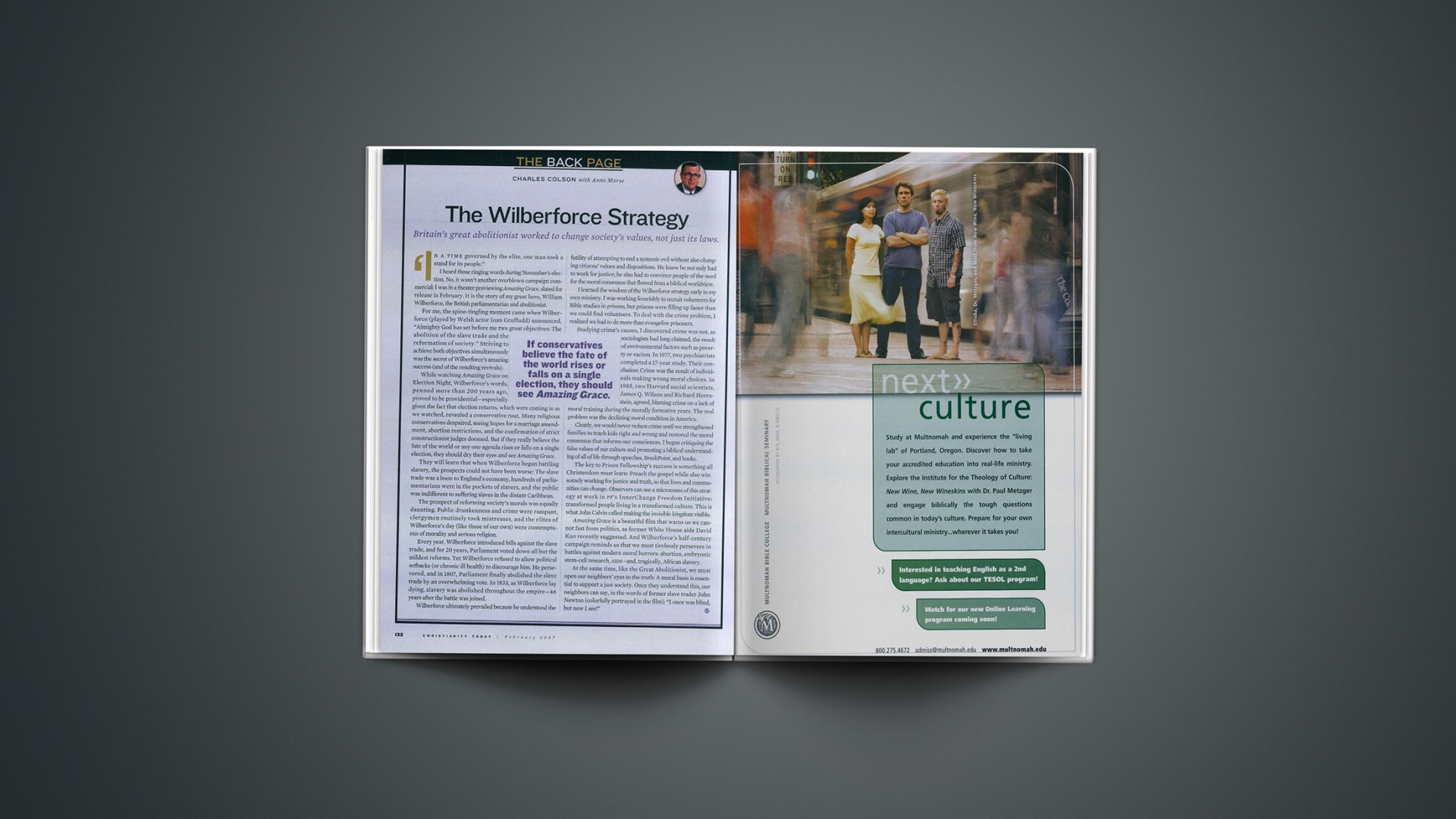“In a time governed by the elite, one man took a stand for its people.”
I heard those ringing words during November’s election. No, it wasn’t another overblown campaign commercial; I was in a theater previewing Amazing Grace, slated for release in February. It is the story of my great hero, William Wilberforce, the British parliamentarian and abolitionist.
For me, the spine-tingling moment came when Wilberforce (played by Welsh actor Ioan Gruffudd) announced, “Almighty God has set before me two great objectives: The abolition of the slave trade and the reformation of society.” Striving to achieve both objectives simultaneously was the secret of Wilberforce’s amazing success (and of the resulting revivals).
While watching Amazing Grace on Election Night, Wilberforce’s words, penned more than 200 years ago, proved to be providential—especially given the fact that election returns, which were coming in as we watched, revealed a conservative rout. Many religious conservatives despaired, seeing hopes for a marriage amendment, abortion restrictions, and the confirmation of strict constructionist judges doomed. But if they really believe the fate of the world or any one agenda rises or falls on a single election, they should dry their eyes and see Amazing Grace.
They will learn that when Wilberforce began battling slavery, the prospects could not have been worse: The slave trade was a boon to England’s economy, hundreds of parliamentarians were in the pockets of slavers, and the public was indifferent to suffering slaves in the distant Caribbean.
The prospect of reforming society’s morals was equally daunting. Public drunkenness and crime were rampant, clergymen routinely took mistresses, and the elites of Wilberforce’s day (like those of our own) were contemptuous of morality and serious religion.
Every year, Wilberforce introduced bills against the slave trade, and for 20 years, Parliament voted down all but the mildest reforms. Yet Wilberforce refused to allow political setbacks (or chronic ill health) to discourage him. He persevered, and in 1807, Parliament finally abolished the slave trade by an overwhelming vote. In 1833, as Wilberforce lay dying, slavery was abolished throughout the empire—46 years after the battle was joined.
Wilberforce ultimately prevailed because he understood the futility of attempting to end a systemic evil without also changing citizens’ values and dispositions. He knew he not only had to work for justice; he also had to convince people of the need for the moral consensus that flowed from a biblical worldview.
I learned the wisdom of the Wilberforce strategy early in my own ministry. I was working feverishly to recruit volunteers for Bible studies in prisons, but prisons were filling up faster than we could find volunteers. To deal with the crime problem, I realized we had to do more than evangelize prisoners.
Studying crime’s causes, I discovered crime was not, as sociologists had long claimed, the result of environmental factors such as poverty or racism. In 1977, two psychiatrists completed a 17-year study. Their conclusion: Crime was the result of individuals making wrong moral choices. In 1985, two Harvard social scientists, James Q. Wilson and Richard Herrnstein, agreed, blaming crime on a lack of moral training during the morally formative years. The real problem was the declining moral condition in America.
Clearly, we would never reduce crime until we strengthened families to teach kids right and wrong and restored the moral consensus that informs our consciences. I began critiquing the false values of our culture and promoting a biblical understanding of all of life through speeches, BreakPoint, and books.
The key to Prison Fellowship’s success is something all Christendom must learn: Preach the gospel while also winsomely working for justice and truth, so that lives and communities can change. Observers can see a microcosm of this strategy at work in PF’s InnerChange Freedom Initiative: transformed people living in a transformed culture. This is what John Calvin called making the invisible kingdom visible.
Amazing Grace is a beautiful film that warns us we cannot fast from politics, as former White House aide David Kuo recently suggested. And Wilberforce’s half-century campaign reminds us that we must tirelessly persevere in battles against modern moral horrors: abortion, embryonic stem-cell research, aids—and, tragically, African slavery.
At the same time, like the Great Abolitionist, we must open our neighbors’ eyes to the truth: A moral basis is essential to support a just society. Once they understand this, our neighbors can say, in the words of former slave trader John Newton (colorfully portrayed in the film): “I once was blind, but now I see!”
Copyright © 2007 Christianity Today. Click for reprint information.
Related Elsewhere:
The Amazing Change campaign includes a petition to end slavery.
CT Movies has a special section on Amazing Grace.
For more on Wilberforce, see Christian History and Biography issue #53, “William Wilberforce and the Abolition of the Slave Trade” and in its list of 131 Christians everyone should know. Christian History Corner featured Wilberforce in a discussion of “ordinary saints” in wartime.
Michael Gerson, former Bush speechwriter and adviser says Wilberforce is an example of faith in politics in ‘How Then Shall We Politick?‘










